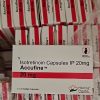Accufine 20mg, a brand name for isotretinoin, is a potent medication used primarily for treating severe, stubborn acne that hasn’t responded to other treatments. It belongs to the retinoid class of drugs, which are chemically related to vitamin A. Accufine works by significantly reducing the production of sebum—the natural oil produced by the skin’s sebaceous glands. Excessive sebum can clog pores, leading to bacterial growth, inflammation, and acne. By minimizing oil production, Accufine helps prevent clogged pores, reduce bacteria, and clear up acne over time.
Due to its effectiveness, isotretinoin is often considered a last-resort treatment for individuals with severe cystic acne, which can cause scarring and significant emotional distress. It offers a powerful solution where other medications, such as topical treatments and antibiotics, have failed.
However, Accufine’s potency comes with potential side effects, some of which are quite serious. Common side effects include dry skin, lips, and eyes, as well as nosebleeds and joint pain. It also increases sensitivity to sunlight, making it easier to develop sunburns.
One of the most critical concerns surrounding Accufine is its teratogenicity, meaning it can cause severe birth defects if taken during pregnancy. As a result, strict guidelines are enforced for women of childbearing potential who are prescribed isotretinoin. This includes regular pregnancy tests and the mandatory use of two forms of birth control during treatment and for a month afterward.
Though the potential risks are high, Accufine can offer long-lasting or even permanent acne relief. For some, it is a life-changing medication, but it requires close medical supervision and careful consideration of the risks. Doctors only prescribe Accufine when the benefits clearly outweigh the risks for the patient.
